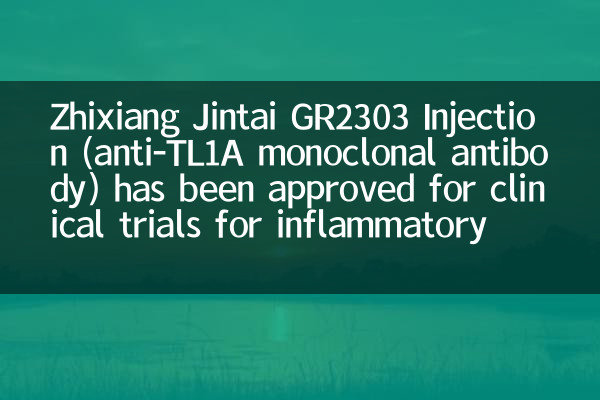Zhixiang Jintai GR2303 Injection (anti-TL1A monoclonal antibody) has been approved for clinical trials for inflammatory bowel disease
Recently, Zhixiang Jintai announced that its independently developed GR2303 injection (anti-TL1A monoclonal antibody) has been approved by the National Drug Administration (NMPA) for clinical trials and is intended to be used to treat inflammatory bowel disease (IBD), including Crohn's disease and ulcerative colitis. This breakthrough has attracted widespread attention from the industry and has brought new treatment hopes for IBD patients.
1. Core information of GR2303 injection

| project | Details |
|---|---|
| Drug name | GR2303 Injection |
| Target | TL1A (Tumor Necrosis Factor-like Ligand 1A) |
| Indications | Inflammatory bowel disease (Crohn's disease, ulcerative colitis) |
| R&D stage | Clinical trial approved (Phase I) |
| R&D companies | Ji Xiang Jin Tae |
| Mechanism of action | Inhibit inflammatory signaling pathways by neutralizing TL1A protein |
2. The scientific value and clinical potential of TL1A targets
TL1A is a member of the tumor necrosis factor (TNF) superfamily and plays a key role in the pathogenesis of IBD. Studies have shown that overexpression of TL1A can aggravate the intestinal inflammatory response, and anti-TL1A monoclonal antibody can relieve symptoms by blocking this pathway. Currently, only a few companies around the world have deployed this target, and GR2303 is the first anti-TL1A monoclonal antibody in China to enter the clinical stage.
| Global TL1A Target Competition Pattern | R&D companies | Progress phase |
|---|---|---|
| Tezepelumab | AstraZeneca/Anjin | Stage III (asthma indication) |
| PRA023 | Prometheus Biosciences | Phase II (IBD) |
| GR2303 | Ji Xiang Jin Tae | Phase I (first in China) |
3. Current market status of inflammatory bowel disease treatment
Inflammatory bowel disease is a chronic and recurrent intestinal disease with more than 10 million patients worldwide, and the incidence rate in China is increasing year by year. Traditional treatments are mainly immunosuppressants and biological agents, but some patients have poor responses. Anti-TL1A monoclonal antibody is expected to become a new generation of therapeutic options.
| Market size of IBD therapeutic drugs in China | 2022 | 2025 (Forecast) |
|---|---|---|
| Market size | 4.5 billion yuan | 7.2 billion yuan |
| Annual growth rate | 18% | 20% |
| Main medicine | TNF-α inhibitor (adalimumab), IL-12/23 inhibitor (Usinumab) |
4. Zhixiang Jintai’s R&D pipeline layout
Zhixiang Jintai focuses on the fields of autoimmunity and anti-infection, and GR2303 is one of its core pipelines. The company has simultaneously promoted a number of innovative drug projects to cover indications such as rheumatoid arthritis and psoriasis.
| Zhixiang Jintai's main R&D pipeline (partial) | Indications | The highest stage |
|---|---|---|
| GR1603 (anti-IFNAR1 monoclonal antibody) | Systemic lupus erythematosus | Phase II |
| GR1801 (anti-IL-4Rα monoclonal antibody) | Atopic dermatitis | Phase I |
| GR2303 (anti-TL1A monoclonal antibody) | Inflammatory bowel disease | Phase I |
5. Industry experts' views and future prospects
Experts in the field of medicine said that the mechanism of anti-TL1A monoclonal antibody is of significant innovation, but clinical safety data should be paid attention to. If Zhixiang Jintai can quickly advance the follow-up experiment, it is expected to seize the initiative in the domestic IBD market. It is expected that if GR2303 is successfully listed, its annual sales peak can reach 1.5-2 billion yuan.
With the improvement of China's innovative drug research and development capabilities, the progress of GR2303 also marks an important step for domestic pharmaceutical companies in the field of autoimmune diseases. In the future, the results of clinical trials of this drug will become the focus of industry attention.

check the details

check the details